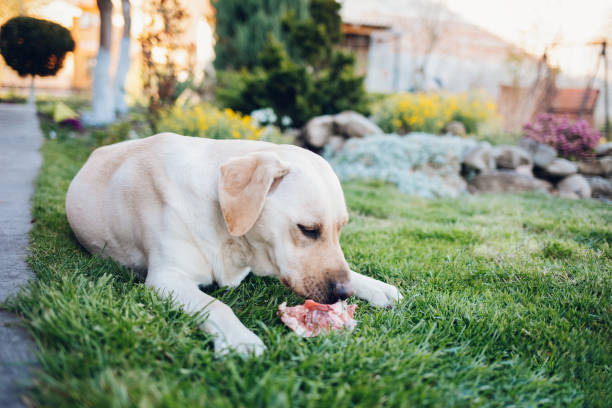Introduction
We all know how Labradors LOVE to eat. It seems that Labradors have an endless appetite for all things delicious. however the eating habits of Labradors start presenting challenges for both the pet owner and the animal. For Labradors, an uncontrolled diet means a higher chance of developing obesity or other diet and metabolism-related diseases. For Pet Owners, it means trying to find the balance. Between a proper diet and discipline that can be hard to enforce. There is no need to worry. Because we have some tips that you can use to manage your Labradors Eat So Much habits. Keep them healthy by understanding the root causes behind your pet’s ravenous appetite in the same way as else.

It All About Genetics
A recent study by the University of Cambridge, published in the journal Cell Metabolism involved more than 300 Labradors. Has found a genetic link that can explain the dietary habits and the increased appetite of Labradors. According to the study, Labradors possess a natural mutation in the POMC gene. This gene is responsible for sending the “off” signal to the brain after the Labrador has had a full meal. If this gene is mutated or deleted, Labradors brain cannot send an off message that counters the feelings of hunger. This means that your Labrador doesn’t realize that they are well fed and continues to feel hungry. Which leads to eating more than necessary. Hence can, in turn, lead to Obesity and decreased physical health in the long run.
Tips for Managing Diet
If your pup is displaying behavior that seems to fall under this category, they may affected by the mutation. Remember that there is a difference between over-eating and the natural dietary changes that occur during your pets’ lifetime. As the Labrador grows, they will naturally require more energy and thus more food, especially during puberty. It is essential to differentiate this natural requirement from the symptoms of a genetic mutation. In fact, if you are sure that your Labrador is eating more than they naturally require. You can follow the tips below to manage the issue.
1- Schedule Mealtimes
Creating and enforcing a strict mealtime schedule is an excellent way to reign in the effects of the mutation and teach your Labrador to only expect meals at certain fixed intervals. Labradors are adept at keeping track of time, and their brains will automatically become tuned to the meal schedule you set if it is properly maintained and enforced.
2- Promote a Fiber-Rich Diet
Switching to a diet that contains a balance of nutrients, yet an excess of fiber, is an excellent way to manage eating disorders in Labradors. The diet’s protein and nutrient components provide the needed energy for the pup. While the fiber content helps the Labrador feel “fuller.” This means that they will eat less, and their appetites will be satisfied as well.
3- Use Puzzle-Style Feeding Bowls
You can combine these two methods with the use of a puzzle or maze-style feeding bowl. Labradors are natural hunters, and their brains attracted to the search for food and scavenging. Puzzle-style slow feeders can provide mental stimulation to your Labrador while at the same time slowing their consumption. This helps your Labrador gain the mental satisfaction they instinctually require and manage their eating habits.
Conclusion
Finally If none of these methods seem to be making a dent in your Labrador’s over-eating habits, you can make a quick trip to the vet to receive some general guidance. If needed, your vet can prescribe appetite suppressants for your Labrador to help medically counter their appetite and prevent the onset of obesity and other diseases. Remember, so too Labradors are naturally prone to Obesity, and managing their diet and mealtimes is essential to maintain their health and quality of life. Take all these tips if your Labradors Eat So Much that hunger.







